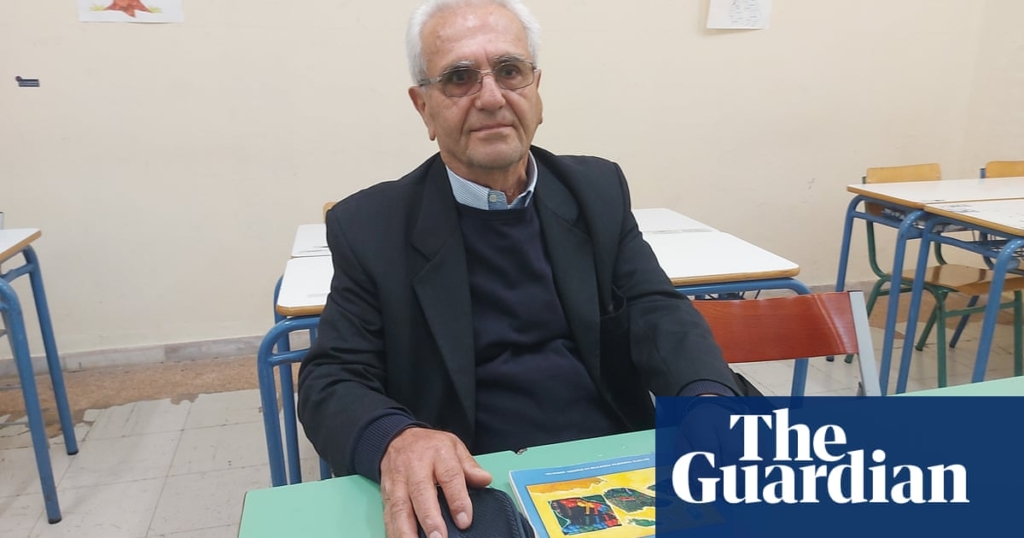Bu içerik, 80 yaşındaki Vasillis Panayiotaropoulos’un eğitimine geri dönüş hikayesini anlatmaktadır. Panayiotaropoulos, neredeyse 50 yıl restoran işleten ve şeflik yapan bir emekli olmasına rağmen, çocukluğundan beri tekrar okula dönme isteğiyle yaşamıştır. 80 yaşına geldiğinde, ikinci bir gece okuluna kaydolmuş ve gençlerin katıldığı bir sınıfa dahil olmuştur. Eğitimine devam ederken, yaşlı nüfusun arttığı bir dönemde, yaşlıların da eğitim alma ve bilgiye erişme hakkı olduğu vurgulanmaktadır. Panayiotaropoulos’un hikayesi, Yunanistan’da gece okullarının güçlendirilmesi gerekliliğine de dikkat çekmektedir. Ayrıca, yaşlılığın yeniden tanımlanması gerektiği ve yaşın sadece bir sayı olmadığına işaret edilmektedir.
[ad 1]
Kaynak: www.theguardian.com
“Everything I learn is interesting,” says Vasillis Panayiotaropoulos. “Being here opens the mind.”
It’s 7.45pm. The bell has rung in another class and the world of classical Greece beckons for the pensioner who has neatly laid out his pencil case and textbooks on a tiny wooden desk.
In his dark suit and polished loafers, Panayiotaropoulos not only cuts a dapper figure in a room whose back wall is spray-painted with graffiti but is by far the oldest pupil attending the second night school of central Athens. At least half of his fellow students are the age of his grandchildren.
Nearly 70 years have passed since the bespectacled octogenarian last attended school.
“I left at the age of 12 to help my father in the fields,” he says recalling his childhood in a village in the Peloponnese. “But in my mind and soul I’ve always had a yearning to go back. It’s a desire that’s never gone away.”
When he turned 80, the former taverna owner told his wife, Maria, a retired seamstress, he was finally going to act on that desire. After almost five decades working as a chef and running a restaurant (“a hard job, a hard life”) in the Greek capital, he walked through the iron gates of the second night school last year.
Today he is enrolled in a class that a 15-year-old would usually attend, a thought that makes his face crease into a smile before he breaks into a chuckle. “Ah, to be 15 again,” he says. “I’ve always had this dream to be filled with knowledge but never thought the day would come when I would actually live it.”
Panayiotaropoulos’s life-changing decision went viral when as the flag-bearer leading a school parade to mark last month’s Oxi Day anniversary – commemorating Greece’s decision to resist Italian forces and enter the second world war on the side of the allies – he was filmed proudly marching past the Greek parliament. Government officials gathered under a canopy in front of the sandstone building appeared to do a double take as the white-haired pensioner, flanked by two mature female students, marched by.
“He was given the honour of carrying the flag because he was the best student in the class,” says Evangelia Pateraki, the school’s headteacher. “He’s extremely diligent and he offers so much to other students. It’s very moving to see people who have not had the same opportunity, who have had to work, come back to school. And it’s also been a lesson. I went and studied abroad, my children went to university and got good jobs. You take these things for granted until you meet those who have not had such possibilities.”
In a nation whose population is projected to shrink drastically over the next quarter of a century, the retiree’s decision carries a certain resonance. By 2050, about 35% of the population of Greece will be above the age of 65, according to Eurostat.
“In societies like ours where life expectancy is on the rise, it sends a message to people of a similar age that in life it’s never too late,” says Dr Pavlos Baltas, a demographer at the National Centre for Social Research.
“But it also helps those of a younger age confront ageism.”
The time, he said, had come to redefine “artificial markers” that delineate the ageing process. “The definition of 65 as the starting point of old age is very artificial and we should be rethinking it,” he says. “After all, 65 is the new 75 at a time when we are all living longer.”
Greece records an average 70,000 births a year but the annual death rate, at an estimated 140,000, is double that.
Declining fertility rates are such that, as in Italy, schools in remote areas of the country have been forced to close for lack of pupils.
The father of two daughters who both went to university, Panayiotaropoulos says he “can’t wait” to become a secondary school graduate in June.
“My favourite lessons are ancient Greek language and maths,” he says. “There are things, facts that have been a bit jumbled in my mind. For example, I wasn’t sure, before, when the Byzantine empire began or ended. It’s so wonderful to have answers.”
Greece’s centre-right government says it is determined to reinforce night schools at a time when elsewhere in Europe they have almost ceased to exist. The country’s demographic problem has been described as “a ticking timebomb” by the prime minister, Kyriakos Mitsotakis.
“We’re focusing on the needs and requirements of students who graduate from them, as well as teaching staff,” deputy education minister Zetta Makri said. “It’s truly commendable when any adult, at any age, decides to return to a school desk … these dreams, effort and faith deserve every support.”
But Panayiotaropoulos, who like so many of his generation in the poverty-stricken 1950s abandoned life in the countryside for the city, neither wants to be seen as a model pupil or as an example to be copied.
“The truth is I was always curious and I always loved to read,” he says. “And cafe culture wasn’t for me. But if you want to write that dreams don’t end, that even at my age they can come true, I’ll be fine with that.”






Yorumlar kapalı.